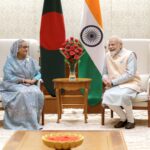Bangladesh’s International Crimes Tribunal (ICT) on July 2, 2025, sentenced former Prime Minister Sheikh Hasina to six months in prison for contempt of court. This marks the first conviction for Hasina since her dramatic ousting from power and flight to India on August 5, 2024, following a student-led uprising.
The three-member ICT bench, headed by Justice Md Golam Mortuza Mozumder, also handed a two-month prison sentence to Shakil Akand Bulbul, a former leader of the banned Bangladesh Chhatra League (BCL). Both sentences will take effect upon their arrest or surrender, as both individuals are currently fugitives.
Case Background: Leaked Audio and “License to Kill” Remark
The contempt case originated from a leaked phone conversation in October 2024 between Hasina and Bulbul. The audio, which went viral on social media and was subsequently picked up by mainstream news outlets, allegedly features a voice identified as Hasina’s stating, “I have had 227 cases filed against me, so I have received a license to kill 227 people.”
A forensic examination conducted by the Criminal Investigation Department (CID) confirmed the authenticity of the recording. Chief Prosecutor Muhammad Tajul Islam argued that this statement constituted contempt of court, asserting it threatened the judicial process and aimed to intimidate those involved in ongoing war crimes trials related to the 2024 mass uprising.
The case was initiated on April 30, 2025, with the Chief Prosecutor filing a contempt complaint. Summonses were issued and published in national dailies, ordering Hasina and Bulbul to appear by June 3, 2025. Hasina failed to appear or appoint legal counsel, leading to the trial proceeding in absentia. A Y Moshiuzzaman was appointed as amicus curiae, while Advocate Aminul Gani Tipu, initially state defense counsel, withdrew due to a conflict of interest.
First Conviction Since Ouster: Implications and Reactions
This conviction is the first legal consequence for Sheikh Hasina since her departure from Bangladesh after nearly 16 years leading the Awami League government. The 2024 uprising, initially sparked by demands for quota reforms in government jobs, quickly escalated into a broader movement against her regime, ultimately forcing her to seek refuge in a safe house in New Delhi, India.
The ICT, originally established in 2010 by Hasina’s government to try war crimes from the 1971 Liberation War, is also pursuing separate and more severe charges against her. In June 2025, the tribunal formally charged Hasina, former Home Minister Asaduzzaman Khan, and former police chief Chowdhury Abdullah Al Mamun with crimes against humanity. These charges allege their involvement, including abetment, incitement, complicity, facilitation, and conspiracy, in the mass killings during the violent crackdown on the 2024 protests, which the United Nations estimates resulted in approximately 1,400 deaths.
The contempt ruling has elicited a range of reactions within Bangladesh. Some view it as a crucial step towards accountability for past actions, while others, as seen in discussions on social media platform X, question whether it represents “revenge politics” or is driven by fear of Hasina’s potential return to power.
The Awami League has vehemently denounced the ICT proceedings as a “mock trial” orchestrated by “anti-national forces.” Meanwhile, the interim government, led by Nobel laureate Muhammad Yunus, continues to navigate the country’s volatile political landscape, aiming to stabilize the nation and prepare for elections tentatively planned for late 2025 or early 2026.
Hasina’s Status and Pending Legal Battles
Sheikh Hasina remains in self-imposed exile in India, reportedly residing in a safe house in New Delhi since August 2024. While there were initial speculations about her seeking asylum in a European country, no confirmed reports indicate she has left India.
Beyond today’s contempt conviction, Hasina faces a formidable array of legal challenges:
- Crimes Against Humanity: The most serious charges, currently being heard by the ICT, involve her alleged role in the mass killings during the 2024 protests. The ICT issued arrest warrants for these charges and summoned her to appear on June 24, 2025, but she has not complied.
- Numerous Murder Charges: Hasina faces at least 227 cases, primarily murder charges, linked to the violent suppression of the 2024 protests. These are the cases she allegedly referenced in the leaked audio.
- Awami League on Trial: The interim government has amended laws to allow for the trial of the Awami League as a political party for its role in the 2024 crackdown. A ban has been imposed on the party’s activities until the trial concludes, implicating Hasina as its leader.
The contempt ruling sets a precedent for holding Hasina accountable despite her absence and could strengthen the prosecution’s narrative in the more severe crimes against humanity charges. Bangladesh is actively seeking her extradition from India, a request that complicates diplomatic relations between the two nations, especially amid rising anti-India sentiment and attacks on the Hindu minority (approximately 8 percent of Bangladesh’s population) in Bangladesh.
The live broadcast of the ICT proceedings, a first in Bangladesh’s history, aims to restore public trust in institutions. However, concerns from the United Nations and Human Rights Watch regarding the ICT’s adherence to due process raise questions about the fairness and potential political motivations behind these trials. As Bangladesh navigates this turbulent period, the outcome of these legal battles will significantly shape its future political and social landscape.


![awami-league[1].jpg](https://southasianherald.com/wp-content/uploads/2025/07/awami-league1.jpg-1170x276.jpeg)



